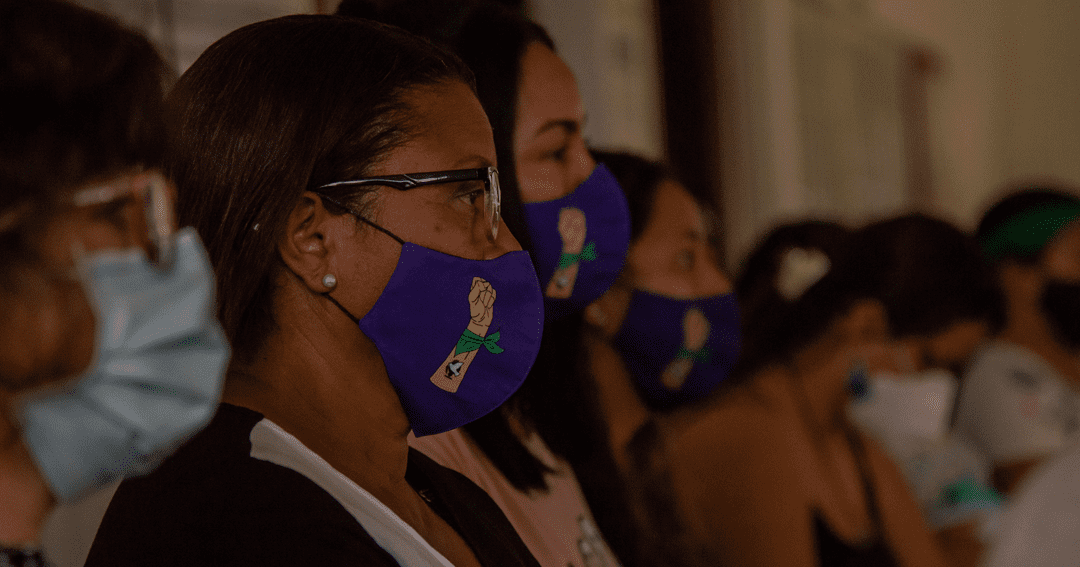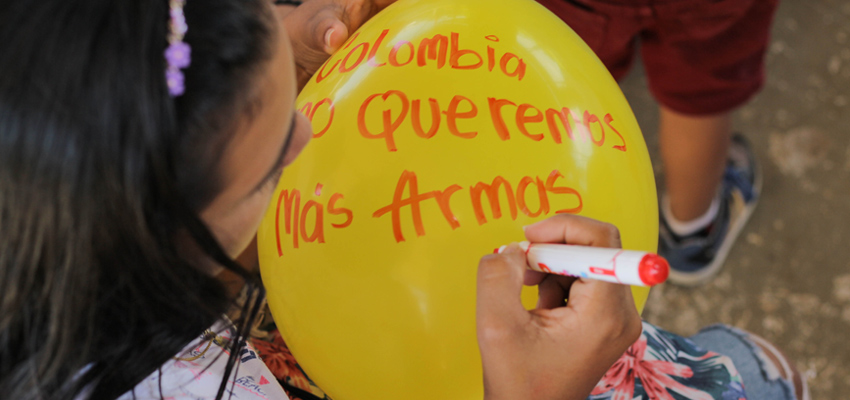Our Work
The Agenda for Women, Peace, and Security emerged from the adoption of UN Security Council Resolution 1325 in 2000. This Resolution explicitly calls on UN member states to guarantee and respect the rights of women and girls, in contexts of armed conflict, and to promote their participation in decision-making spaces before, during and after conflicts. Since the 1325 expedition, other resolutions such as 1829, 1888, 1889, 1960, 2106, 2122 and 2242 have been elaborated that deepen and give content to this Agenda.
Resolution 1325 and related resolutions are an international reference framework for the work of achieving and maintaining peace and security in Colombia. Limpal makes use of this Resolution for the prevention of violence in the work it carries out in the territories, through workshops related to conflict resolution, as well as for the reconstruction of the social fabric and reconciliation processes, with processes of memory and healing, especially with women victims of the armed conflict. We carried out a sustained process of national and international advocacy for the establishment of a National Action Plan of the Resolution in Colombia in order to translate it into concrete actions that generate changes in the lives of women.
We defend the idea, as the Agenda says, that women are not only victims of the armed conflict, but they are also key agents for the construction of peace and security. That is why we encourage their participation in decision-making spaces, so they recognized as active and indispensable subjects in the post-conflict process that Colombia is going through. Finally, we investigate the role of women in the implementation of Resolution 1325 in Colombia (linkear a página 5), and we are part of the Coalition 1325 platform, a union of national and regional women's organizations that monitor the progress of the implementation of the Resolution in the country. At the international level, together with the sisters of WILPF in the world, we advocate for the positioning of the Agenda ‘Women, Peace and Security’ considered to be fundamental in the development of peacebuilding processes.
Some of our standpoints on the Women, Peace and Security Agenda are:
![]() It is urgent that Colombia establishes an Action Plan for Resolution 1325 that recognizes the role of women in peacebuilding processes.
It is urgent that Colombia establishes an Action Plan for Resolution 1325 that recognizes the role of women in peacebuilding processes.![]() The inclusion of women as active agents in peacebuilding and reconciliation promotes stable peace and human security.
The inclusion of women as active agents in peacebuilding and reconciliation promotes stable peace and human security.![]() The implementation of Resolution 1325 and related resolutions helps prevent conflicts, promotes women's rights in conflict and post-conflict situations and contributes to the consolidation of an integrated approach that includes the Women, Peace and Security Agenda, disarmament and human rights.
The implementation of Resolution 1325 and related resolutions helps prevent conflicts, promotes women's rights in conflict and post-conflict situations and contributes to the consolidation of an integrated approach that includes the Women, Peace and Security Agenda, disarmament and human rights.

The Agenda for Women, Peace, and Security emerged from the adoption of UN Security Council Resolution 1325 in 2000. This Resolution explicitly calls on UN member states to guarantee and respect the rights of women and girls, in contexts of armed conflict, and to promote their participation in decision-making spaces before, during and after conflicts. Since the 1325 expedition, other resolutions such as 1829, 1888, 1889, 1960, 2106, 2122 and 2242 have been elaborated that deepen and give content to this Agenda.
Resolution 1325 and related resolutions are an international reference framework for the work of achieving and maintaining peace and security in Colombia. Limpal makes use of this Resolution for the prevention of violence in the work it carries out in the territories, through workshops related to conflict resolution, as well as for the reconstruction of the social fabric and reconciliation processes, with processes of memory and healing, especially with women victims of the armed conflict. We carried out a sustained process of national and international advocacy for the establishment of a National Action Plan of the Resolution in Colombia in order to translate it into concrete actions that generate changes in the lives of women.
We defend the idea, as the Agenda says, that women are not only victims of the armed conflict, but they are also key agents for the construction of peace and security. That is why we encourage their participation in decision-making spaces, so they recognized as active and indispensable subjects in the post-conflict process that Colombia is going through. Finally, we investigate the role of women in the implementation of Resolution 1325 in Colombia (linkear a página 5), and we are part of the Coalition 1325 platform, a union of national and regional women's organizations that monitor the progress of the implementation of the Resolution in the country. At the international level, together with the sisters of WILPF in the world, we advocate for the positioning of the Agenda ‘Women, Peace and Security’ considered to be fundamental in the development of peacebuilding processes.
Some of our standpoints on the Women, Peace and Security Agenda are:
- Is urgent that Colombia establishes an Action Plan for Resolution 1325 that recognizes the role of women in peacebuilding processes.
- The inclusion of women as active agents in peacebuilding and reconciliation promotes stable peace and human security.
- The implementation of Resolution 1325 and related resolutions helps prevent conflicts, promotes women's rights in conflict and post-conflict situations and contributes to the consolidation of an integrated approach that includes the Women, Peace and Security Agenda, disarmament and human rights.
Universal disarmament has been one of WILPF’s goals since its founding in 1915, but why do we care so much about disarmament?
![]() We live in a world where there are 15,000 nuclear weapons in the hands of nine countries, that could be detonated at any moment, leaving more deaths than atomic bombs (http://www.icanw.org/the-facts/nuclear-arsenals/).
We live in a world where there are 15,000 nuclear weapons in the hands of nine countries, that could be detonated at any moment, leaving more deaths than atomic bombs (http://www.icanw.org/the-facts/nuclear-arsenals/).
![]() Military spending in the world amounts to 17 trillion dollars each year. To give you an idea, in 2015 military spending in the United States accounted for 54% of its discretionary spending, while education received only 7% of that budget (https://bit.ly/2rg4XsQ; https://archive.attn.com/stories/11036/how-military-and-education-spending-compare-america).
Military spending in the world amounts to 17 trillion dollars each year. To give you an idea, in 2015 military spending in the United States accounted for 54% of its discretionary spending, while education received only 7% of that budget (https://bit.ly/2rg4XsQ; https://archive.attn.com/stories/11036/how-military-and-education-spending-compare-america).![]() Armed violence kills 535,000 people every year in the world, as if the entire population of a city like Tucson, Arizona would completely disappear every year.
Armed violence kills 535,000 people every year in the world, as if the entire population of a city like Tucson, Arizona would completely disappear every year.
In Colombia, the situation is not very different:
![]() Colombia is the country that invested the most in military spending in 2017 in South America, according to SIPRI (Stockholm International Peace Studies Institute).
Colombia is the country that invested the most in military spending in 2017 in South America, according to SIPRI (Stockholm International Peace Studies Institute).![]() Since 2018, Colombia is a "global partner" of NATO, the largest military alliance in the world, which translates into military cooperation and support in matters related to electronic and maritime security, the fight against terrorism and organized crime.
Since 2018, Colombia is a "global partner" of NATO, the largest military alliance in the world, which translates into military cooperation and support in matters related to electronic and maritime security, the fight against terrorism and organized crime.![]() According to Medicina Legal (2017), 53% of the murders of women in Colombia are committed with firearms (http://www.medicinalegal.gov.co/documents/20143/262076/Forensis+2017+Interactivo.pdf/0a09fedb-f5e8-11f8-71ed-2d3b475e9b82 , Page 95)
According to Medicina Legal (2017), 53% of the murders of women in Colombia are committed with firearms (http://www.medicinalegal.gov.co/documents/20143/262076/Forensis+2017+Interactivo.pdf/0a09fedb-f5e8-11f8-71ed-2d3b475e9b82 , Page 95)
In this situation, the Liga Internacional de Mujeres por la Paz y la Libertad (Limpal Colombia) fights for disarmament understood not only as of the surrender of weapons by armed groups but also as a paradigm shift of weapons as tools to resolve conflicts. We insist on the importance of the Colombian State to exercise strict control over the legal and illegal weapons circulating in the country and to reduce military spending, taking into account the post-conflict process it is going through. In addition, we believe in the need to analyze the differential impact that arms have on women.

In 2017 we launched the campaign "Women for Disarmament: More Life, Less Weapons" whose objective is to put the importance of control over small arms and light weapons in the public opinion and in the political agenda of Colombia for the prevention of armed violence against women. Through an investigation that has the same name (taggear investigación de la página 5 “Mujeres por el desarme: una mirada al desarme desde la Resolución 1325”), we denounce how the proliferation of this type of weapon exacerbates violence against women and increases the degree of lethality of them, in addition to other violence that weapons make possible such as psychological violence, sexual violence, human trafficking, among others.
Some of our standpoints on disarmament are:
![]() It is essential to foster critical antimilitarist consciousness in Colombia.
It is essential to foster critical antimilitarist consciousness in Colombia.![]() Spending on arms goes against the post-conflict process that Colombia is going through.
Spending on arms goes against the post-conflict process that Colombia is going through.![]() The Arms Trade Treaty (ATT) to prevent the entry of arms into Colombia used for human rights violations should be ratified immediately in accordance with the commitments assumed by Colombia in the framework of the 20th session of the Universal Periodic Review before the CEDAW (link note on the subject).
The Arms Trade Treaty (ATT) to prevent the entry of arms into Colombia used for human rights violations should be ratified immediately in accordance with the commitments assumed by Colombia in the framework of the 20th session of the Universal Periodic Review before the CEDAW (link note on the subject).![]() It is necessary to transform the paradigm of security based on weapons and militarization by one that puts human security at the center, focusing on women.
It is necessary to transform the paradigm of security based on weapons and militarization by one that puts human security at the center, focusing on women.![]() The subsistence of violence is due, among other things, to the difficulties of the Colombian State in maintaining its monopoly on arms.
The subsistence of violence is due, among other things, to the difficulties of the Colombian State in maintaining its monopoly on arms.



